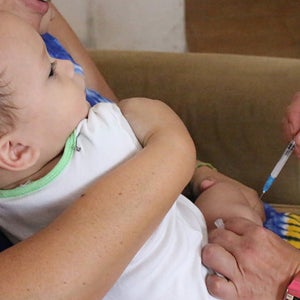
According to the latest epidemiological update from PAHO, there have been 2472 confirmed cases of measles in eleven countries in the region so far this year. PAHO continues to recommend measures to prevent cases and halt further transmission of the virus.
Washington, DC, 24 July 2018 (PAHO)- According to the latest epidemiological update from the Pan American Health Organization (PAHO), emitted on 20 July 2018, a total of 2472 confirmed cases of measles have been reported from 11 countries in the Americas so far this year.
The majority of the cases occurred in Venezuela (1613 cases) and Brazil (677), followed by the United States (91), Colombia (40), Canada (19), Ecuador (17), Argentina (5), Mexico (5), Peru (3), Antigua and Barbuda (1) and Guatemala (1).
Data shows that since the last epidemiological update released on 8 June, which reported 1685 cases, the number of cases has grown by 787 - an increase of more than 45%. Over 92% of these were reported in Brazil and Venezuela.
In light of continued reports of imported measles cases from other regions, and ongoing outbreaks in the Americas, PAHO urges all Member States to:
- Vaccinate to maintain homogenous coverage of 95% with the first and second doses of measles, mumps, rubella (MMR) vaccine in all municipalities.
- Vaccinate at-risk populations, without proof of vaccination or immunity against measles and rubella, such as healthcare workers, people working in tourism and transportation (hotels and catering, airports, taxi drivers, and others) and international travelers.
- Maintain a reserve of measles-rubella (MR) vaccines and syringes for control of imported cases in each country of the Region.
- Strengthen epidemiological surveillance of measles to achieve timely detection of all suspected cases of measles in public and private healthcare facilities and ensure that samples are received by laboratories within 5 days of being taken.
- Provide a rapid response to imported measles cases through the activation of rapid response teams to avoid the re-establishment of endemic transmission. Once a rapid response team has been activated, continued coordination between the national and local levels must be ensured, with permanent and fluid communication channels between all levels.
- Identify migratory flows from abroad (arrival of foreign persons) and internal flows (movements of population groups) in each country, to facilitate access to vaccination services, according to the national scheme.
Additionally, PAHO/WHO recommends advising that all travelers over 6-months-of-age who cannot show proof of vaccination or immunity, that they receive the measles and rubella vaccine, preferably the triple viral vaccine (measles, mumps and rubella - MMR), at least two weeks before traveling to areas where measles transmission has been documented.
Measles in indigenous communities
Indigenous populations living close to the Venezuelan borders are particularly vulnerable to measles outbreaks.
According to the epidemiological update, 126 cases were reported from the Yanomami communities in the municipality of Alto Orinoco, state of Amazonas, Venezuela, where there is currently an outbreak. The cases include 53 deaths probably associated with measles.
The states of Amazonas and Roraima in Brazil, also confirmed 77 measles cases in Yanomami (and Ye'kuna) communities, most of them in the Indigenous Health District of Auaris bordering Venezuela.
Links
- Epidemiological update - measles (20 July)
- All epidemiological updates on measles



